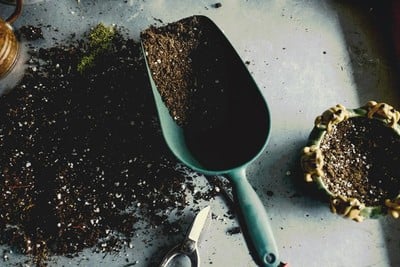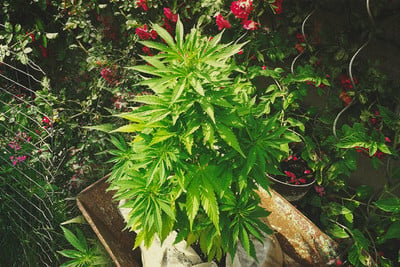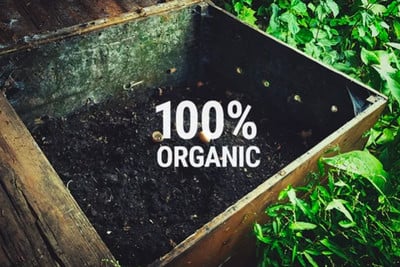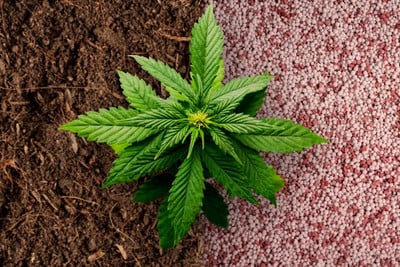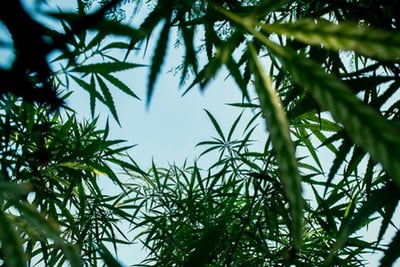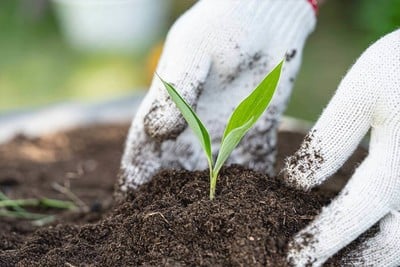.

Lactic Acid Bacteria: A Probiotic for Cannabis Plants
LAB are bacteria that can ferment sugars into lactic acid, which can result in a range of beneficial effects for your cannabis grow. From improving the soil biome to helping your plants fend off pests, using LAB can take your grow to the next level.
Contents:
Are you one of those growers who seeks out ever better yields? Or, do you simply love understanding exactly how cannabis plants work? Well, today we’ll take a look at lactic acid bacteria (LAB), which can enhance various aspects of plant performance—and give you an opportunity to fine-tune your grow one step further!
In this article, we'll discuss how LAB works in relation to weed, and how you can harness it to get the most out of your grow.
What Are Lactic Acid Bacteria?
LAB are a diverse group of beneficial microbes known for their ability to ferment sugars into lactic acid. These bacteria are naturally present in a wide variety of environments, including soil, plants, and the gastrointestinal tracts of humans and animals. LAB play an important part in regulating the balance of the microbiome in both plants and humans, so why not utilise this to the benefit of your crop?
You might be more familiar with these bacteria than you initially think. For instance, in the food industry, LAB are widely used for the fermentation of dairy products such as yoghurt, cheese, and kefir, as well as in the production of fermented vegetables like sauerkraut and kimchi. If you’ve ever looked into improving your gut health with fermented foods, you’ve likely come across products that use LAB!
More recently, LAB have been studied as a promising new avenue for agriculture. Their application in farming offers a sustainable approach to improving plant health, enhancing soil fertility, and boosting crop yields.
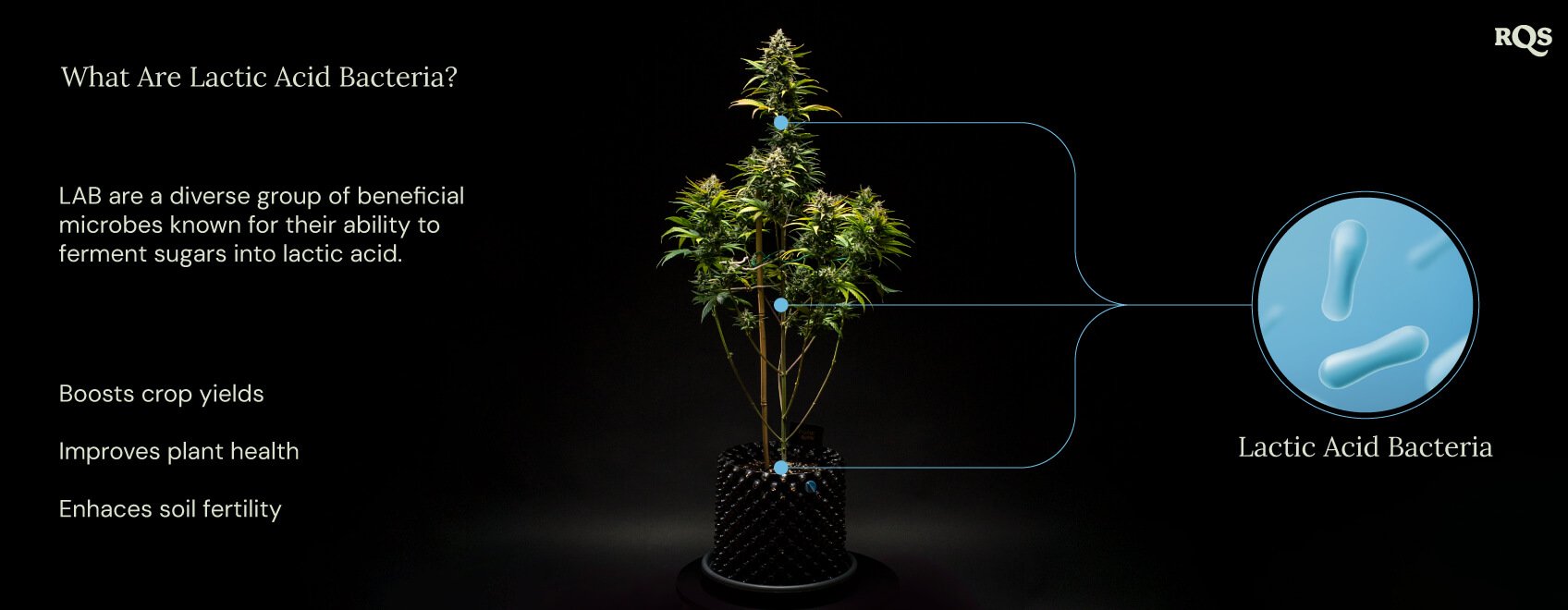
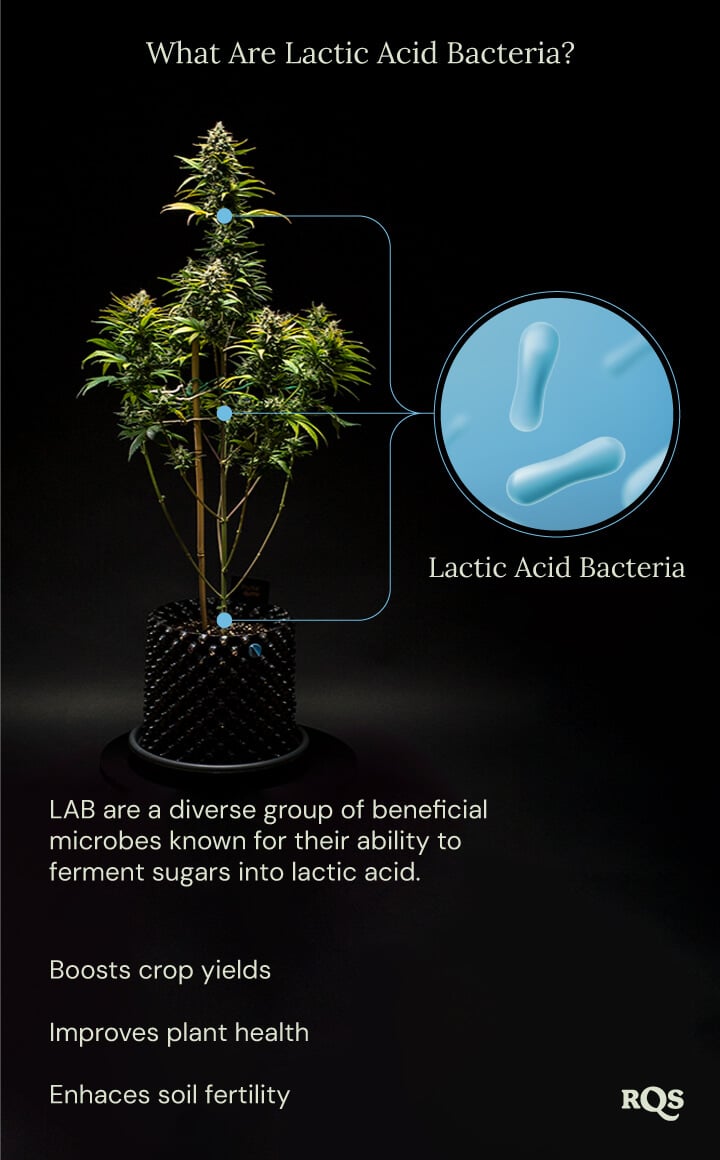
The Benefits of LAB When Growing Weed
LAB can act as a powerful probiotic for plants, including weed, and this can help to enhance the way they process nutrients, meaning they use everything at their disposal optimally. But what does this mean come harvest time? Well, ultimately it means bigger yields of more potent buds, and the potential for more flavour to boot. Now, using LAB isn’t going to change your life if other factors aren’t dialled in, but if you’re looking for that extra 1%, this might be it.
-
LAB as a Biostimulant
Lactic acid bacteria function as a biostimulant by enhancing the plant's natural processes, leading to improved growth and development. When applied effectively to cannabis plants, LAB can have a whole range of benefits, such as the stimulation of metabolic activities, promotion of root growth, and the enhancement of nutrient uptake. Some studies[1] have even shown that LAB can improve the efficiency of photosynthesis, which leads to more robust and vigorous growth. This results in healthier plants with higher yields and better-quality buds—which should make all growers happy!
-
LAB as a Biofertiliser
As a biofertiliser[2], LAB can improve soil fertility by helping to increase the decomposition of organic matter and nutrient cycling when added to the soil as an amendment. When used in this way, it breaks down complex organic compounds into simpler forms that plants can easily absorb, increasing uptake of macronutrients and micronutrients—and further increasing the effectiveness of organic feeding methods.
This process enriches the soil with essential nutrients such as nitrogen, phosphorus, and potassium, and lesser-known nutrients that all contribute to healthy and vigorous growth. What’s more, LAB can even help to maintain soil structure and increase its water-holding capacity, which can reduce the amount of water you need to give to your plants, and help to stabilise pH levels.
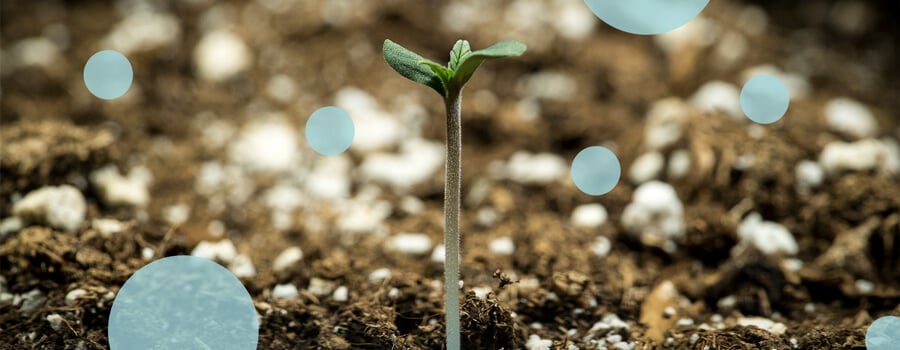
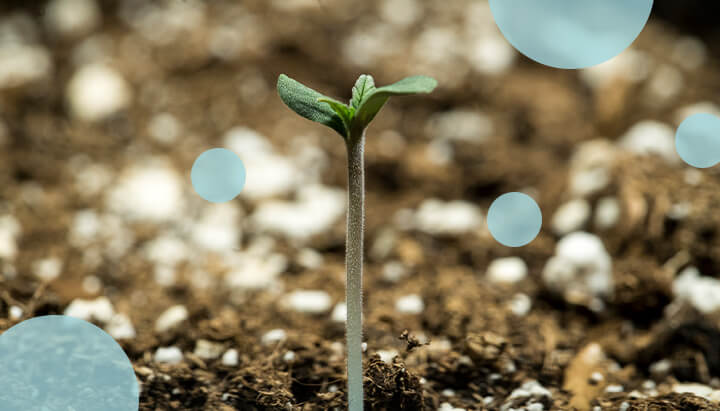
-
LAB Fight Off Pests and Disease
Another advantage of using LAB in cannabis cultivation is the ability to protect plants from pests and diseases. You might not be too worried about the presence of pathogens[3], until one day they strike, at which point you’ll realise how annoying, or devastating, they can be! So use LAB, and you may never have to find out.
LAB produce various antimicrobial substances, including bacteriocins and organic acids, that inhibit the growth of harmful bacteria, fungi, and other pathogens on the plant and in the soil. These natural defence mechanisms help to reduce the incidence of common cannabis diseases[4] such as powdery mildew, root rot, and Botrytis. Combine these effects with the fact that LAB can help your plants absorb more nutrients, and you have the perfect recipe for a strong plant immune system and a healthier environment!
-
LAB Help Foster Living Soil
Living soil is a concept that emphasises the importance of a healthy, dynamic soil ecosystem where diverse microorganisms, organic matter, and plants interact to create a self-sustaining environment—basically mimicking a true, healthy natural habitat. Soil should be a thriving ecosystem, not a vessel for inert nutrients.
Lactic acid bacteria play a crucial role in fostering living soil by accelerating the decomposition of organic matter and promoting nutrient cycling, which encourages the growth of a whole range of microorganisms in the soil biosphere. Furthermore, the bacteria themselves serve as a food source for other beneficial microbes, creating a balanced and thriving soil microbiome. This microbial diversity enhances soil fertility, improves plant health, reduces the development of pathogens in the soil, and leads to more resilient cannabis crops.
-
LAB Enhance Cannabis Seed Germination
Using LAB is thought to be able to significantly improve the germination rates of cannabis seeds. LAB-treated seeds have demonstrated increased germination speed and higher success rates, ensuring a strong start for your plants. Though the beneficial effects of LAB on seed germination are not fully understood, they are generally attributed to their ability to enhance nutrient availability, stimulate root growth, and protect seeds from soil-borne pathogens.
LAB shouldn’t be your first port of call when it comes to germinating seeds, as there are other far more important factors. But if you’re experienced and you know what you’re doing, then it can make a highly valuable addition.
How to Make LAB for Weed Plants
Creating LAB at home is simple and cost-effective, and anyone who wants to should be able to do it very easily. Below, find the equipment you’ll need followed by the necessary steps to add LAB to your crop!
Equipment
- Rice
- Water
- Milk (preferably raw or unpasteurised)
- Jar with a lid
- Cheesecloth or breathable fabric
- Rubber band
- Measuring jug and spoons
- Strainer or fine mesh sieve
- Pipette
Directions
- Prepare rice water: First, rinse around 200 g of rice with 250 ml of water. Do not dispose of the rinse water, but collect it in a jar, as it contains the starches and beneficial microbes that will serve as a nutrient source for the LAB.
- Fermentation: Cover the jar with cheesecloth and secure it with a rubber band. Let it sit at room temperature for 3–7 days while it ferments. During this period, naturally occurring lactic acid bacteria that are already present will start to multiply in the rice water.
- Add milk: Now, strain the fermented liquid to remove any solid particles, and mix the liquid with roughly 10 parts milk. This milk will provide additional nutrients and a suitable environment for LAB to thrive and grow (think kefir). Then, allow this mixture to ferment for another 7 days. During this stage, you will notice a separation into layers, with the clear liquid (LAB serum) on top.
- Harvest LAB: After the fermentation is complete, use a pipette to carefully collect the clear liquid (LAB serum) from the top layer. This serum is rich in lactic acid bacteria and can be stored in a sealed container in the refrigerator for several months without feeding—it will lie dormant. The LAB serum can be used directly as a foliar spray or soil drench for your cannabis plants. You can dispose of the milk.
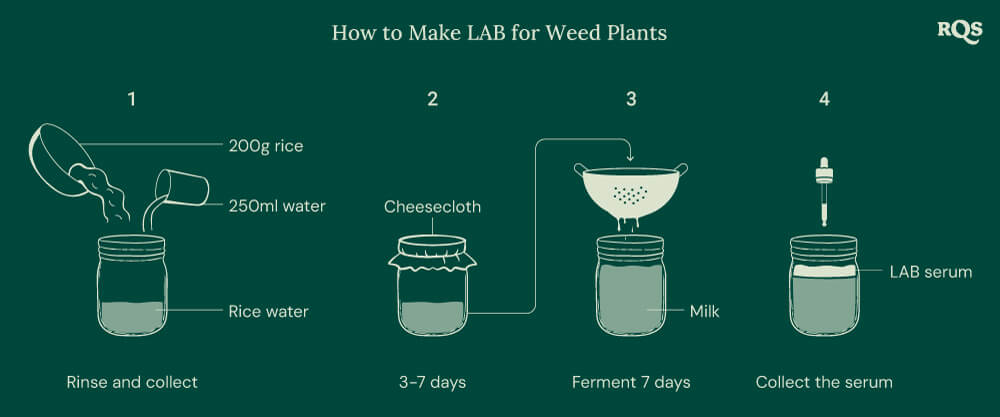
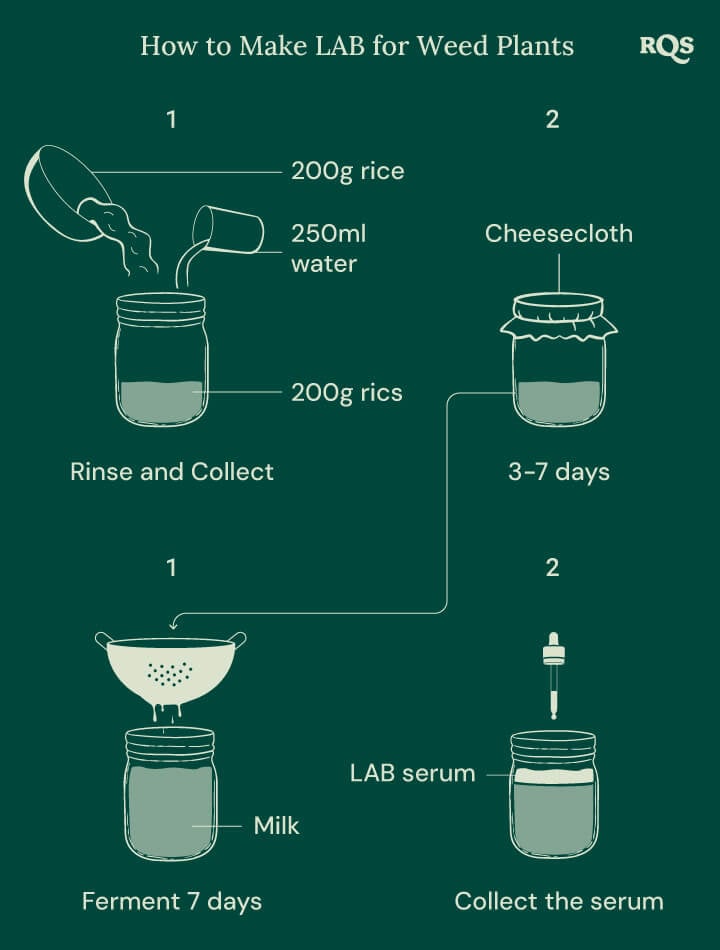
How to Use LAB on Cannabis Plants
Using LAB on your cannabis plants is straightforward. Here's how to do it.
- Foliar spray: To use it as a foliar spray, dilute the LAB serum with water at a 1:20 ratio (one part LAB serum to 20 parts water) and spray it liberally onto the leaves of your cannabis plants. Foliar application can help to boost plant immunity, improve nutrient absorption, and protect against foliar diseases. For best results, spray the plants early in the morning or late in the evening to avoid leaf burn from the sun; if growing indoors, spray after you’ve switched the lights off.
- Soil drench: If you want to improve the soil biome, mix the LAB serum with water at a 1:10 ratio and apply it directly to the soil around the base of your cannabis plants. You can do this as part of a normal watering routine to avoid overwatering your plants. This method, as mentioned, can promote root health, enhance nutrient uptake, and support the overall soil microbiome. Apply the soil drench once a week for best results.
- Seed treatment: To improve germination rates, soak your cannabis seeds in a diluted LAB solution (1:30 ratio) for a few hours before planting them in their first substrate. This treatment is thought to be able to improve germination rates and protect seedlings from soil-borne diseases.
Lactic Acid Bacteria and Weed: Harness the Power of Microbes
Using lactic acid bacteria in your weed grow can potentially lead to healthier plants, better yields, and a more sustainable growing process. Not only can it improve the quality of soil, but it can also fight off pathogens and even speed up and increase rates of germination.
As stated, the addition of LAB to your grow isn’t going to revolutionise your growing experience. Rather, if you’re already providing your plants with superior care and attention, it will add another beneficial element to your overall practice, helping to make for an even more refined product and process!
- https://www.sciencedirect.com/science/article/abs/pii/S0038071716304151
- Applied Sciences | Free Full-Text | Importance of Lactic Acid Bacteria as an Emerging Group of Plant Growth-Promoting Rhizobacteria in Sustainable Agroecosystems https://www.mdpi.com
- Agriculture | Free Full-Text | The Biocontrol of Plant Pathogenic Fungi by Selected Lactic Acid Bacteria: From Laboratory to Field Study https://www.mdpi.com
- The potential of lactic acid bacteria in mediating the control of plant diseases and plant growth stimulation in crop production - A mini review - PMC https://www.ncbi.nlm.nih.gov





























